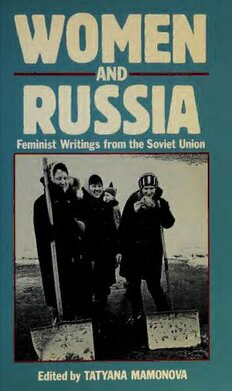
Women and Russia: feminist writings from the Soviet Union / PDF
Preview Women and Russia: feminist writings from the Soviet Union /
Women and R ussia о Arkhangelsk • Petrozavodsk Leningrad Tallinn • Moscow • Sverdlovsk Vilnius Magnitogorsk • Nezhin ; Donbas , Anapa Alma-Ata* Samarkand • Erevan Feminist Writings from the Soviet Union Foreword by Robin Morgan Translated by Rebecca Park and Catherine A. Fitzpatrick R ussia Tatyana Mamonova, editor with the assistance of Sarah Matilsky BASIL BLACKWELL © Tatyana Mamonova, 1984 First published in Great Britain in 1984 by Basil Blackwell Publisher Ltd 108 Cowley Road, Oxford 0X4 1JF, UK “The Other Side of the Coin” and “The Woman and Prison: A Conversation with Galina Zlatkina and Valeriya N.” were originally published in Freedom Appeals (May-June 1980). “The Poster Woman” and “With the grandeur of Homer and the purity of Sappho ...” were originally published in Woman and Russia (London: Sheba Feminist Press, September 1980). Frontispiece illustration © Genady and Tatyana Mamonova. All rights reserved. Except for the quotation of short passages for the purposes of criticism and review, no part of this publication may be reproduced, stored in a retrieval system, or transmitted, in any form or by any means, electronic, mechanical, photocopying, recording or otherwise, without the prior permission of the publisher. British Library Cataloguing in Publication Data Mamonova, Tatyana Women and Russia 1. Women—Soviet Union—Social Conditions I. Title 305.4'2'0947 HQ1663 ISBN 0-631-13389-7 ISBN 0-631-13891-9 Pbk Library of Congress Cataloging in Publication Data Main entry under title: Women and Russia. 1. Feminism—Soviet Union—Addresses, essays, lectures. I. Mamonova, Tatyana, 1943— . II. Park, Rebecca. III. Fitzpatrick, Catherine A. HQ1663.W63 1983 305.4'2'0947 82-73963 ISBN 0-8070-6708-3 ISBN 0-8070-6709-1 (pbk.) Printed in Great Britain by Page Bros, Norwich. Contents Foreword Robin Morgan ix Introduction The Feminist Movement in the Soviet Union Tatyana Mamonova xiii Working Women 1 Woman Worker Valentina Dobrokhotova 5 Interview with a Career Woman Galina Grigoryeva Svetlana Sonova 11 The Poster Woman Irina Tishchenko 21 Everyday Life 23 In the Northern Provinces Vera Golubeva 27 Why Soviet Women Want to Get Married Ekaterina Alexandrova 31 Zinochka Expands Her Circle of Bohemian Friends Ludmila Kuznetsova 51 Foremothers 59 My Grandmother Z. Sinaneft 63 I’m from Armenia Tsovinar Tsovinyan 67 Forty Maidens O. Kurbangaeva 73 vi Contents Women, Birth, and the Family 89 An Uphill Battle Kari Unksova 93 A Few More Words on the Subject of Free Medical Treatment Valentina Leftinova 107 The Other Side of the Coin Natasha Maltseva 111 Upbringing 117 How We Learned about Tatyana Larina Nadezhda Zotova 121 About the New Americans Ekaterina Mironova 127 Between Women 133 Mistress of the High Mountain Lyubov Razumovskaya 137 The Right to Be Myself Inessa Tominaite 145 Verses from the Cycle “To My Contemporary” Yelena Lastenko 151 “With the grandeur of Homer and the purity of Sappho . . Zhanna Ivina 155 Dropouts and Dissidents 165 A Day in the Life Zoya Galitskaya 169 Drug Addicts P. Z. Ahmedova 177 The Woman and Prison: A Conversation with Galina Zlatkina and Valeriya N. Galina Grigoryeva 193 Contents vii Women and the State 201 The Soviet Woman: Support and Mainstay of the Regime Alla Sariban 205 A Discussion with the KGB Tatyana Mamonova 215 About the Almanac Nina Yarina 223 The Everyday Gulag The Editors 229 Actions and Counteractions The Editors 235 Women and Peace 245 “We Need Peace and We Need the World” Ekaterina Alexandrova 249 The Peace March: East and West Tatyana Mamonova 261 Contributors9 Biographies 267 Foreword ROBIN MORGAN In 1979, a group of extraordinarily brave women in the Soviet Union, knowing virtually nothing about the Women’s Move ment in the rest of the world, reinvented feminism. They wrote, typed, and circulated ten copies of the first feminist samizdat (underground publication), Women and Russia. After months of interrogation and intimidation by the KGB (Com mittee for State Security), four of the feminist “ringleaders” were finally sent into exile. Others still remain behind, writing under pseudonyms, trying to organize women. These women are unlike any dissidents you’ve read or heard about before. They acted out of purely personal pain, rage, commitment, and vision—and without the prestige, contacts, or support available to such a major literary figure as Solzhenit syn. They faced down opposition not only from Soviet au thorities who accused them of treason and “counterrevolution,” but also from many men of the dissident community itself, both in the U.S.S.R. and abroad, who accused them of frivolity and divisiveness. (It would appear that male supremacists every where have all read the same secret primer on How To Attack Women, especially those women merely demanding their mini mal human rights.) In August of 1980, I flew to Vienna for a week of intensive meetings with four of these women; the result was a set of inter views—the first in-depth articles about their personal and pri vate lives—which I wrote for the cover story of Ms. magazine (November 1980). The days in Vienna were alive with em braces, shared laughter and tears, and an inordinate amount of strong tea. Tatyana Mamonova and I talked about everything
